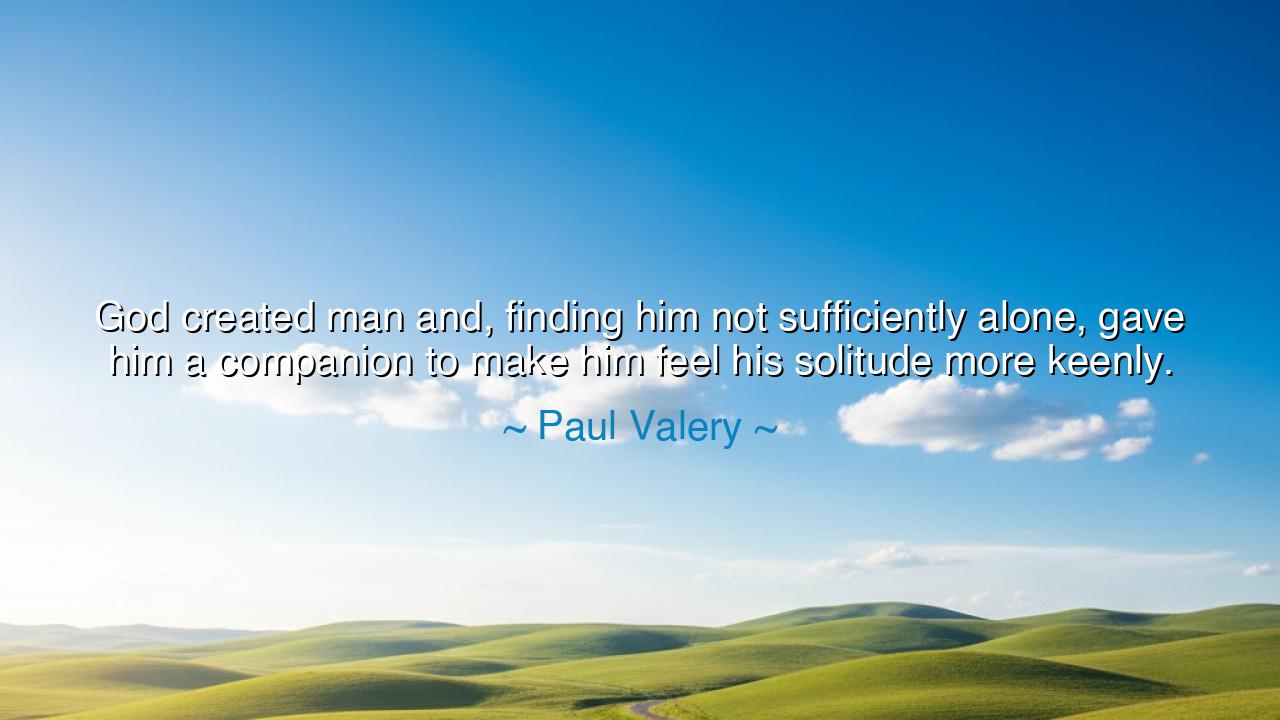
God created man and, finding him not sufficiently alone, gave him
God created man and, finding him not sufficiently alone, gave him a companion to make him feel his solitude more keenly.






"God created man and, finding him not sufficiently alone, gave him a companion to make him feel his solitude more keenly." — thus spoke Paul Valéry, the poet-philosopher who wandered the shadowed corridors of the human soul. In these words lies not mockery of love, but revelation of its mystery and burden. He gazed upon the nature of companionship and saw that it does not dissolve solitude — it deepens it. For when man stands alone, he knows only the silence of his own heart; but when he stands beside another, he perceives the abyss between two souls, and learns that no bridge, however tender, can fully span it.
In the beginning, when God created man, the world was silent and whole. The rivers murmured, the stars burned in endless chorus, yet man felt a hollowness that echoed within him — the ache of being incomplete. So God, in His divine irony, gave him a companion, not to erase that void, but to illuminate it. For through love and closeness, man comes to see the limits of his own being. The other becomes a mirror that reflects both his beauty and his desolation. Thus, in the warmth of another’s presence, he learns that true solitude is not the absence of people, but the eternal distance between hearts.
There is an ancient tale of the emperor Hadrian, who loved the youth Antinous with a devotion that defied reason and empire. Together they journeyed through the lands of Greece and Egypt, bound by affection yet haunted by silence. When Antinous drowned in the Nile, Hadrian’s grief was like a second creation — he raised temples and cities in his name, deifying the lost beloved. Yet behind his monuments lay the truth Valéry speaks of: that love, even at its most radiant, reveals how utterly alone we remain in our hearts. Hadrian, surrounded by marble and adoration, felt the unbearable echo of solitude sharpened by love.
For what is companionship but the meeting of two eternities that cannot merge? We touch, we speak, we weep together, yet each consciousness remains an island floating upon the infinite sea. Love, friendship, even the sacred union of marriage — all are gestures across the void. And yet, therein lies their nobility. For to reach toward another, knowing you can never completely arrive, is the heroism of the soul. It is the divine play of yearning and surrender, the eternal dialogue between self and other, between man and the divine silence that dwells within him.
This quote, though clothed in irony, is in truth a meditation on the paradox of intimacy. The closer we draw to another, the more sharply we sense the invisible wall between us. But this is not a curse; it is a blessing disguised as pain. For in that awareness of separation lies the birth of compassion, patience, and awe. When we see that no one can fully know the landscape of our heart, we begin to respect the hidden worlds within others. Thus, solitude becomes not a wound, but a sacred inheritance — the sign that we are each unique, infinite, and known fully only by God.
Consider the poet Rainer Maria Rilke, who wrote, “Love consists in this: that two solitudes protect, and border, and greet each other.” He understood what Valéry hinted at — that the purpose of companionship is not to dissolve solitude, but to sanctify it. To love deeply is to stand beside another soul and whisper, “I cannot fully know you, yet I choose to remain.” In that humble acknowledgment, love ceases to be possession and becomes reverence. The heart learns to love not by erasing distance, but by dwelling beautifully within it.
The lesson, then, is this: do not flee from your solitude, and do not demand that another fill it. Instead, bring it as an offering to those you love. Sit beside them, not as one who hungers to be completed, but as one who carries an inner light to share. Learn to speak, and also to be silent. Listen for the spaces between words — there, the divine breath still moves. When you feel the ache of distance, do not despair; know that it is the very tension that gives love its meaning.
So live, then, as one who honors the mystery of togetherness — two souls standing side by side beneath the vastness of heaven, bound not by ownership, but by wonder. Recognize that every embrace contains both union and separation, that every glance exchanged across the table is a meeting of galaxies. And when you feel your solitude most keenly in the presence of another, remember Valéry’s truth: it is God Himself who wrote this paradox into the heart of creation — that through love, man may come to know not only another, but the unfathomable depths of his own soul.






AAdministratorAdministrator
Welcome, honored guests. Please leave a comment, we will respond soon